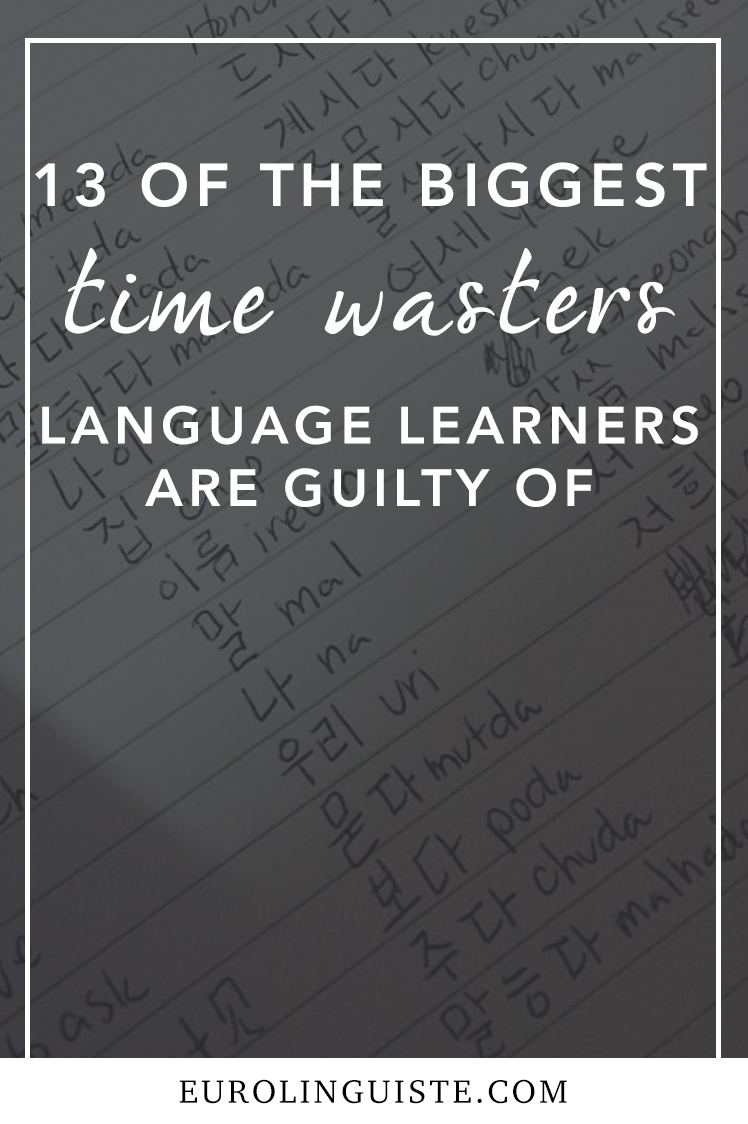13 OF THE BIGGEST TIME WASTERS LANGUAGE LEARNERS ARE GUILTY OF

My name is Shannon Kennedy and I'm the language lover,…
At a quick glance, it’s easy to feel like you don’t have time to learn a language. It’s also easy to blame not making any progress on a lack of time, as well.
But when you take a closer look at how you’re spending the time you do have with your language, you may find that you’re guilty of poor time management. Just a few small changes could make your learning that much more productive and the time you do have suddenly doesn’t feel so limiting.
Here are 13 of the biggest ways that language learners waste time.
Are you guilty of any of these?
1 // Spending too much time learning how to learn a language rather than actually learning it
I am so guilty of this first one. I often get carried away researching language learning methods and tools that I forget to actually use them to learn a language. I get so caught up learning how to learn a language that I never sit down and work with a language-specific resource to study the language itself.
Working on becoming a better learner is a great way to be more efficient when you study, but only if you actually put the techniques you learn to practice.
2 // Reviewing when it isn’t needed
I wrote a post a short while back on how to decide whether you need to review or learn new material, but sometimes, even knowing that you’ve passed the stage where you need to review isn’t enough. It’s easy to feel like we need to keep reinforcing what we already know, so we do just that. The problem is, when you review too much and forget to tackle new material, you end up plateauing.
Review is great when you need it, but if you’re using it to procrastinate learning any new material, it can be a huge time waster.
3 // Learning things that you won’t use or that aren’t relevant
According to the next chapter in your course book, you need to learn how to talk about cassette players, the franc and rotary phones. Makes sense?
Erm… not really.
Just because the material is presented to you, doesn’t mean you have to learn it. Especially if it’s something you’ll never use.
Use your time to learn the words and phrases you actually need – those that are relevant and that you know you’ll use. Don’t waste time with material that won’t serve any purpose to you personally.
4 // Not learning “language chunks”
Vocabulary is one thing and grammar is another, but sometimes learning “chunks” of language is a better way to go about your studies than learning vocabulary and grammar as two separate things.
Let’s take a look at a couple of examples where this is the case.
Cases // Cases are tough. And when you try to learn the rules for them on their own, it’s frustrating. Especially when you then need to go back and apply them to the vocabulary you already learned. Instead of learning to say “the store” and then the case for “at”, just learn how to say “at the store” from the start.
Common expressions // Learning language chunks such as “how are you”, “nice to meet you”, etc. is far easier than trying to piece those phrases together later (especially when they don’t word-for-word translate).
Conversation connectors // Again, learning to say “I think that…” or “In that case…” is easier than learning “I”, “to think” and the right conjugation, then “that”.
There are tons of ways language chunks can serve as a “shortcut” to communicating more fluidly sooner. If you aren’t employing them in some way, you’re not fully maximizing your study time.
5 // Not studying consistently
Remember how I said unnecessary review is a waste of time? Guess what one of the biggest causes for needing review is?
Inconsistent study.
This is one of the most dangerous time wasters because it really hinders any progress you could make with your study. The more often you work with your language, the more it stays fresh and the less you’ll need to review.
6 // Thinking that speeding through things means you’re learning faster
Instead of spending the time you need to truly learn the material, you speed through it. You have a vague grasp of how it works, but later down the line, it turns out that what you did wasn’t enough.
Guess what that means?
It means that 1) newer and more complex aspects of the language are further out of reach than they should be basic you’re building on a shaky foundation and 2) more review is in your future.
Speeding through language lessons is a huge time waster because it guarantees you’ll have to go back later. It also means you’re less likely to grasp new material.
7 // Taking too long or too frequent breaks
Again, this is all about consistency. Breaks, on occasion, are not a bad thing. But when you’re doing them too often or for too long, it’s hard to regain any momentum you may have had with your learning.
8 // Not using the right resources
So-and-so said that X resource is the best resource on the planet. That means you should use it right?
Not necessarily.
The best resources are those that help you meet your goals and those that you will actually use.
Don’t waste time or money on resources that aren’t going to be either of those things for you.
9 // Avoiding the aspects of the language that challenge you
Does the Spanish subjunctive have you trembling in your boots? Perhaps Japanese particles send you running or the Korean honorific system taunts you.
Whatever it is, avoiding it will only cause problems for you later.
Yes, you can use hacks to get around it at the beginning, but if you ever hope to get to a more advanced level, you’ll need to tackle it at some point.
The longer you wait to do it, the more time you have to build it up as this big scary thing in your head. Eventually it gets to the point that you’ve created this idea that whatever it was you were nervous about seems insurmountable. You psych yourself out about it and you waste too much time trying to figure out how to get around it than you would actually siting down to work through it.
10 // Collecting resources rather than using them
Tons of resources may look pretty on the shelf, but the time you spend collecting them is a huge waste if you don’t ever use them.
You also end up spending more time rearranging, organizing and shuffling through them.
11 // Passive Listening
Just because the podcast is playing doesn’t mean that you’re getting anything out of it.
You need to actively listen to and engage with the audio you’re using in order to get anything out of it. If you just have it on in the background while you focus on other things, you aren’t using your time with it well.
12 // Multitasking
When you multitask, it may seem like you’re getting more done, but that isn’t necessarily the case. You may be doing more, but you’re doing more poorly.
When you multitask, you’re not focused. And when you’re not focused, you’re not being as productive as you could be. By not multitasking, you also product better results.
13 // Not having clear goals and the plans to get to them
If you don’t have a destination, you don’t have a path to follow. You end up meandering around, trying out different resources without making any real forward progress.
In order to use your time wisely and make significant progress with your learning, you need to have something to aim for and a path to get you there.
That’s it – 13 time wasters language learners are often commit.
Are you guilty of any of these? What do you do to avoid them?
I’d love to hear from you in the comments!
My name is Shannon Kennedy and I'm the language lover, traveler, and foodie behind Eurolinguiste. I'm also the Head Coach of the Fluent in 3 Months Bootcamp, co-founder of Women in Language, and former Resident Polyglot at Drops.




